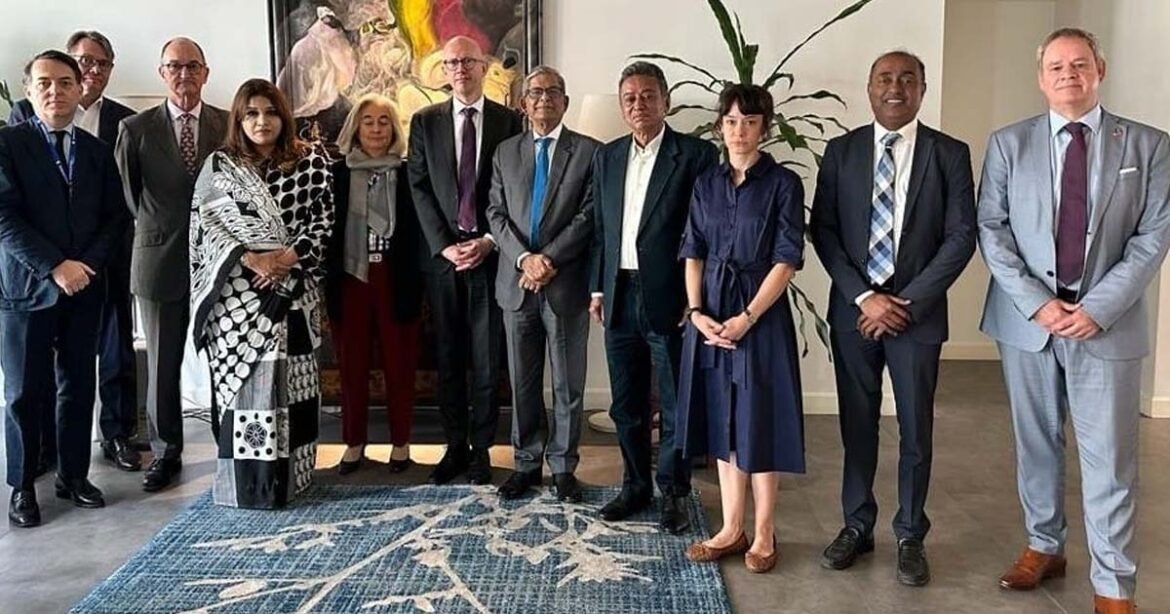BNP, the Bangladesh Nationalist Party, has initiated a meeting with the delegation of European Union members from eight countries recently. The meeting commenced at around 10:00 am at the residence of Charles Whiteley, the ambassador and head of delegation of the European Union (EU) to Bangladesh.
In recent times, BNP has been seen meeting foreign diplomats frequently. After the press release of the latest meeting comes out to the appearance of mass people, and the dialogues too, there comes the importance of pointing out a crucial question, namely, “Is the BNP becoming a foreign-lobby oriented party?
What happened in the meeting?
According to a member of the BNP chairperson’s media wing, Sayrul Kabir Khan, the meeting marks an essential dialogue between the opposition party and the European Union. The discussion aims to discuss various political and social issues that are currently affecting Bangladesh. Besides the spokesperson, the BNP delegation comprised other members, including Amir Khasru Mahmud Chowdhury, a standing committee member; Shama Obaid, the organising secretary (Dhaka division); and Asaduzzaman Asad, the secretary of the party’s human rights affairs.
YOU CAN ALSO READ: THE RISE AND FALL OF INDIAN TYCOONS WHAT’S NEXT FOR ADANI’S BELEAGUERED BUSINESS EMPIRE?
The BNP delegation raised their voices for their 10-point demand at the meeting, which includes the government’s resignation and the installation of a non-partisan interim government during the upcoming national elections scheduled for early in the next year. The party has been vocal in its demand for an impartial caretaker government to oversee the elections, citing concerns over the incumbent government’s interference in the electoral process. The BNP has accused the ruling party of manipulating past elections to secure their victory, and they are calling for the creation of a non-partisan government to ensure a fair and transparent electoral process. The BNP delegates also claimed that they are hopeful that the EU will support their demands.
EU’s stances
On February 16, prior to the meeting with the BNP delegation, the EU ambassadors met with the ruling party, the Awami League. The delegation was led by Obaidul Quader, the party’s secretary and road transport and bridges minister. Charles Whiteley led the seven-member delegation of the EU ambassadors in the meeting.
According to diplomatic sources, during the meeting, the EU ambassadors informed the Awami League delegation of their decision to send a team of election observers to monitor the 12th parliamentary elections in Bangladesh.
The Awami League delegation reportedly welcomed the EU’s decision to send election observers. The move was seen as a positive step towards ensuring a transparent and fair electoral process in the country.
It is to be noted that the EU did not send any election observers to the 11th parliamentary elections held in Bangladesh in 2018. This decision was made due to concerns over the electoral process and human rights violations in the country. However, the decision to allocate a budget for election observation in the upcoming parliamentary elections indicates that the EU is willing to engage and support the democratic process in the country.
Why the question of BNP turning into a lobby-oriented party raised?
According to reports, the BNP previously appointed a total of eight lobbying firms in the United States. This move has been met with concern from the Bangladesh government and has been viewed as an attempt to undermine the country’s democratic process and stability. The government has accused the BNP of engaging in anti-state activities, spreading misinformation about the country on the international stage, and seeking the help of the international communities rather than relying on their own power.
At that time, the Prime Minister, Sheikh Hasina, said, “It is not possible for the BNP to assume power by lobbying foreign entities. This kind of activity appears as if the BNP is relying on outside forces to bring them into power, which is an unrealistic dream.” The premier also added, “In the past, the BNP may have become successful in using brokers to achieve their targets, but such techniques are no longer eligible in Bangladesh. The country has progressed beyond such practices, and relying on foreign agents to achieve political power is no longer an option.” The Prime Minister accused the BNP of complaining to their foreign and domestic allies against the government of the Awami League. The Prime Minister further added that the BNP leaders are making these complaints despite the fact that the Awami League has not done anything wrong to them, unlike what the BNP did to the Awami League when they were in opposition.
According to the Information Minister Hasan Mahmud, “The leaders of the BNP are aware that their chances of winning in elections are less. Therefore, they have resorted to scheming and plotting various conspiracies. In addition, instead of connecting with the public, the party is reportedly trying to cultivate relationships with foreign diplomats.”


